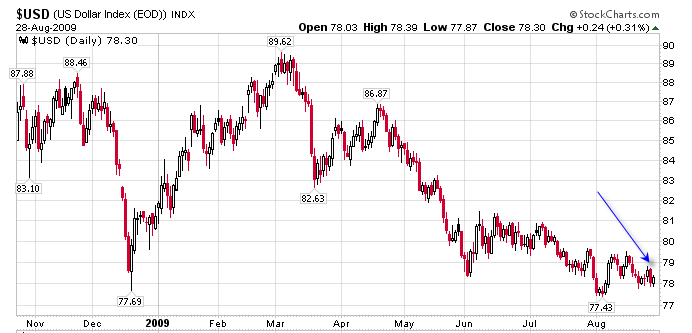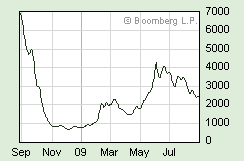How Will China Handle The Yuan?
Currencies / China Currency Yuan Sep 01, 2009 - 12:49 PM GMTBy: Mike_Shedlock
 Inquiring minds are asking "How Will China Handle The Yuan?"
Inquiring minds are asking "How Will China Handle The Yuan?"
It's a good question, too. Lance Lewis has a conversation with Professor Ryan Krueger in index/a/24294" target="_blank">How China Will Handle the Yuan describing how it might play out. Please click on the above link for one possibility.
Here is the same conversation except with me replying to Lance instead of Professor Ryan Krueger.
Lance Lewis: You notice the extra chunky volume in the Chinese Yuan ETF (CYB) yesterday at the same time that the dollar reversed violently?
Mish: This violent reversal?

That looks like normal day to day action to me.
Lance: I’m telling ya. Something is up with China and the yuan. It would explain a lot. What if it were close to revaluing against the dollar?
We know it's fed up with funding US debt, but it can’t stop funding it as long as it continues to peg to the dollar and is forced to buy dollars every day in order to hold down the yuan. The US isn’t even its largest export market anymore. The EU is. The US consumer is broke. Why does China need to keep exporting cheap goods to the US if the US consumer can’t buy them anyway?
Now look at the recent market action in August. Normally when Chinese stocks go down, the dollar rallies and commodities get hit, just like in early August when people were betting on “the usual.” But this time, after the initial knee-jerk reaction to Chinese stocks sliding, “the usual” didn’t happen. Oil is now back on its highs. Gold is close to breaking out, and the dollar is back on its low for the year. And all of this is occurring even as Chinese stocks are back on their lows as of last night?
China revaluing the yuan is the only thing that fits, and the US Treasury may even have an inkling that it’s coming, which would explain why Obama suddenly renominated Gentle Ben on a Tuesday in late August when he was supposedly on vacation. Rather odd timing, but not so if the intent was to remove as much uncertainty as possible as to who will be running the Federal Reserve going forward in order to prevent complete panic in the dollar and Treasuries if China were to one day say “I’ve had enough” to buying more dollars and Treasuries every single day in order to hold her dollar/yuan peg.
It’s the only thing that fits. If so, the dollar would get smoked, literally, “overnight” and gold would explode. Bonds would probably get crushed, too.
Mish: No, it's not the only thing that fits. China is printing more RMB (yuan) on a relative basis than the US is printing dollars. It is using that printed money to buy commodities and China is arguably on the verge of overheating.
Moreover, the Baltic Dry shipping index is collapsing. This suggests a weakening of demand for commodities.

Oil is indeed firm, but China has also been stockpiling. How much longer that can go on with little demand for China's exports is anyone's guess.
EU may have passed the US as China's biggest trading partner, but EU consumers are not in such great shape either. For a discussion of
Europe and how it relates to this mess, please see Deflation Is A *****.
Indeed, consumers are tapped out everywhere, and arguably European and Chinese banks are in worse shape than US banks.
Moreover, there is also a not-so-little thing called peak oil that might be keeping oil firm. And it's hurricane season.
The critical issue however, is simple math.
The US runs a trade deficit with China. That means China must accumulate US assets. China does not have a choice in the matter; it is purely a mathematical function. When the US runs a deficit, mathematically someone must run a surplus.
There is no choice in the matter other than to raise the price of goods so high that consumers won't buy them. Pray tell, what would that do to unemployment and civil unrest in China? What would that do to demand in Europe? It is virtually impossible for China to strengthen its currency to the US dollar without affecting every other currency as well.
Some might suggest that China should buy oil with those dollars, but then what would the Mideast exporters do with them?
The reason China is buying fewer US treasuries recently is that the US deficit with China is shrinking. Again this is a simple mathematical equation, not some massive conspiracy to dump the dollar. Of course China could buy US ports and bridges or oil companies instead of treasuries, but such maneuvers have been blocked by Congress and last I checked no ports or bridges are for sale.
Lance: Wal-Mart (WMT) would be in trouble. It probably wouldn’t be able to raise prices on all the cheap Chinese goods, and I’d likely have to just eat it with thinner margins. That would go for a lot of retailers actually, and their pain would be compounded by higher gasoline prices squeezing the consumer even more. What fun we’ll have.
Mish: The whole world is on thinner margins. Deflation has set in and one quarter or two of massive stimulus that is likely to fail sooner rather than later does not change that fact. Deflation is a process that takes years to play out. One or two quarters of rebound means no more to the US than it did to Japan over its two lost decades, now going on three.
In spite of record worldwide stimulus, a global recession is everywhere you look except perhaps in China. The reason is simple. When the Chinese government "suggests" banks should lend, banks lend. This is how command economies "work", using the word "work" loosely. Yes, the US has massive problems, but let's have an honest assessment of problems elsewhere.
Bottom line, China is busy ramping up production for consumers that don't exist: Not here, not in the EU, and not in China (not yet). This love affair with China, a country that will not float its currency or offer freedom of speech, and hides bank solvency issues even more so than the US, is way overdone.
Ironically, over the years, I have been a staunch defender of China, on average. Remind me to reconsider decoupling when China allows freedom of speech and floats the RMB instead of pegging it.
Lance: Question is how smart are the Chinese? Dumb enough to keep printing yuan in order to hold it down versus the tidal wave of dollars that are crashing on her shores, and at the same time fund gargantuan US government-deficit spending out of the kindness of its heart? Or smart enough to say “enough!”
Mish: As discussed above, that tidal wave is a mathematical equation. More importantly, "dumb" might be in the eyes of numerous dollar bears expecting dollar Armageddon vs. Chinese officials fearing social unrest.
Please remember the other side of the coin, namely 10's of millions of workers that China desperately wants to keep employed at nearly any cost to avoid civil unrest. A weak currency helps Chinese exports, thus keeping workers employed.
A 4-Minute Tour of the China Property Bubble
What is China doing with all that printing? Please take a A 4-Minute Tour of the China Property Bubble to find out.

World's Largest Shopping Mall Sits Vacant
The world's largest shopping mall, South China Mall in Guangzhou, China, is almost entirely empty. Click on the link to see a fascinating video.
If you thought Minnesota's Mall of America was the world's biggest shopping center, think again. South China Mall is a Vegas-like spectacle built in 2005 that now sits almost entirely empty. In the current economic climate, could this be a symbol of things to come?



The entire mall sits empty save 10-12 small shops.
Malinvestments and Commodity Prices
Think about all the concrete, steel, copper, and energy it took to build that mall. This is not an isolated case either as the previous 4-minute video shows.
Let's not confuse a renewed crack-up boom in China with a sustainable recovery. And let's not pretend much of this building is anything other than malinvestment.
Decoupling Theories Way Premature
Think about the wages those store owners get. Think about wages in China in general.
For more on wages and malinvestments please see Inside China: A Sculptor's View, an email exchange with Bill Hopen, a sculptor who frequently travels to China, often for months at a time. That post and the above videos should help open eyes.
Decoupling theories are very premature, at best.
What Would Happen If China Floated The RMB?
Yes, the US is printing. However, please remember that China, the UK, and most other countries are too. And on a relative basis, China's stimulus package is greater than the US stimulus package.
It's relative differences in printing and other such factors that will help determine currency trends. And as much as commentators pick on US stats like GDP, mark to market accounting, off sheet balances, etc, bear in mind we have far less believable data on China.
For starters, Chinese GDP numbers are simply bogus.
Professor Vitaliy Katsenelson has discussed that idea on several occasions including China's Growth an Accounting Miracle.
Once China had announced its 8 percent growth target, it began to disburse funds directed at a sharp increase in public works spending. It is important to understand that the disbursal of funds is recorded as GDP growth. So the government can easily control the pace of growth by the pace at which it releases funds that have already been allocated in the stimulus package to the creation of higher production or growth numbers. Funds disbursed for fixed-asset investment by state-owned enterprises or provincial governments are counted as having been spent when they are disbursed.
.... I am not convinced China will have inflation in the long-run. It appears that deflation is a more likely scenario as China is ridden with overcapacity – the country was geared for much higher global growth. I can, however, see inflation erupting in a very short timeframe as money has been thrown at the consumer/companies, and we are seeing this in the stock market and real estate. But in the long run, inflation appears an unlikely outcome: overcapacity and slower demand from the US and Europe will force Chinese producers to cut prices to increase utilization and stimulate demand.
And finally, I'm sure China doesn’t want the renminbi to be the world’s currency as it would drive up the value – a suicide for an export-based economy.Professor Katsenelson was discussing China: Bogus Boom? by John Makin. It's a real gem, and well worth a look.
For all the complaints about US banks hiding things (and yes US banks are hiding things massively so), at least we have balance sheets and footnotes to look at and decipher. Can we say the same about China?
US banks are in trouble, but it is a huge mistake to think Chinese banks are in better shape.
I repeat my comment made earlier: When the Chinese government "suggests" banks should lend, banks lend. This is how command economies "work", using the word "work" loosely. Yes, the US has massive problems, but let's have an honest assessment of problems elsewhere.
In light of the above, if China floated the RMB while giving an accurate assessment of its GDP and the true state of affairs with its banks, the RMB might crash.
How would China handle that? Better yet, how would the world handle that?
Such fears are the most likely reason behind China's currency peg in the first place. Yes, China is taking steps towards floating the RMB, but China seldom rushes into things, often taking years or even decades to make major policy shifts.
Gold Seasonality And Fundamentals
By the way, I happen to agree with professor Lewis that gold seasonality is favorable. I agree with him that the intermediate to long-term fundamentals for gold are positive. We simply differ as to what those fundamentals are.
At times, in unfavorable seasonality gold has rallied. At times it doesn't. And please don't think that gold does well in times of inflation and deflation because it doesn't. Proof is simple: There was inflation every step of the way from 1980 to 2000 with gold dropping from 850 to 250 while every other asset class soared.
Gold does well in times of credit stress (stagflation, hyperinflation, or deflation). I think we can all agree (one way or another) that this has been a period of high credit stress.
Short-term I do not know, nor does anyone else what gold will do. Last year at this time, in spite of favorable seasonality gold sold off. However, unlike most other commodities, gold regained nearly everything it lost. Are we in for a repeat? No one really knows.
However, should a dollar crash occur and gold soar, given that I own gold I would benefit. On the premise that gold is money and gold should do well in deflation, I did expect gold to hold up well and it did.
Prechter, who does not view gold as money, thinks gold will collapse. Thus, not all deflationists think alike.
This post is long enough. Inquiring minds may wish to consider Countdown To Dollar Implosion Madness for a discussion of how trade deficits affect the situation.
Key Take-Aways From The Discussion
1) China will act in China's best interest.
2) China, not US market theorists will make the decision. That decision is not so clear cut once one looks at both sides of the coin.
3) China tends to move slowly in such decisions.
Regardless of what happens, dollar-crash theories involving China and BRIC mandates, secret meetings, and other speculation are getting a bit out of hand in numerous places. There are easily two sides of the coin (if not more), and China is apt to move slowly whichever way it moves.
By Mike "Mish" Shedlock
http://globaleconomicanalysis.blogspot.com
Click Here To Scroll Thru My Recent Post List
Mike Shedlock / Mish is a registered investment advisor representative for SitkaPacific Capital Management . Sitka Pacific is an asset management firm whose goal is strong performance and low volatility, regardless of market direction.
Visit Sitka Pacific's Account Management Page to learn more about wealth management and capital preservation strategies of Sitka Pacific.
I do weekly podcasts every Thursday on HoweStreet and a brief 7 minute segment on Saturday on CKNW AM 980 in Vancouver.
When not writing about stocks or the economy I spends a great deal of time on photography and in the garden. I have over 80 magazine and book cover credits. Some of my Wisconsin and gardening images can be seen at MichaelShedlock.com .
© 2009 Mike Shedlock, All Rights Reserved
Mike Shedlock Archive |
© 2005-2022 http://www.MarketOracle.co.uk - The Market Oracle is a FREE Daily Financial Markets Analysis & Forecasting online publication.



